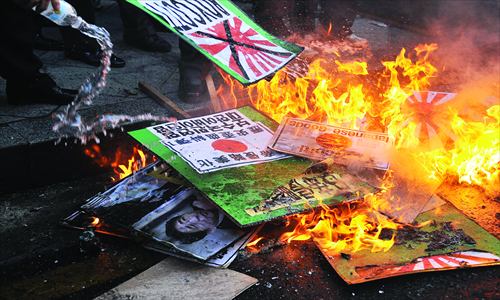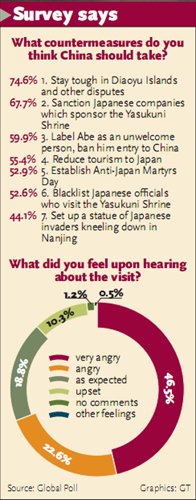HOME >> CHINA
Public wants tough stance on Japan
By Chang Meng and Liu Yunlong Source:Global Times Published: 2013-12-28 1:23:01

Conservative South Korean activists burn a placard during a protest against Japanese Prime Minister Shinzo Abe visiting the Yasukuni Shrine to mark the first anniversary of his taking office, in Seoul on Friday. South Korea expressed anger at Abe's visit to a controversial war shrine, calling it "anachronistic behavior." Photo: AFP

A Global Times poll shows that over 65 percent of respondents consider that tensions between China and Japan are unlikely to ease within five years following Japanese Prime Minister Shinzo Abe's Thursday visit to the Yasukuni Shrine, and are calling for countermeasures from the government.
The survey, conducted by the Global Times Global Poll Center through online polls on Friday, attracted 1,077 respondents aged over 18 in seven cities including Beijing, Shanghai, Chengdu, and Shenyang.
The Shinto shrine, originally run by the Japanese government, is now in private hands; it enshrines Japan's war dead as "deities." The commemoration of those convicted as war criminals was originally forbidden in post-war years, but 14 "Class-A" war criminals were enshrined in 1978. The museum attached to the shrine is also noted for its strongly right-wing, nationalistic tone and refusal to accept Japan's war guilt.
Nearly 70 percent of the respondents felt "angry" or "very angry" upon hearing the news of Abe's visit, and only 18.8 percent said the move was an expected one.
In response to the statement by Japanese Chief Cabinet Secretary Yoshihide Suga that Abe made a "private visit," China's foreign ministry spokeswoman Hua Chunying said Friday that the "unconvincing allegation is not worth rebutting at all."
"What we can see is hypocrisy, unscrupulousness, and self-contradiction," Hua added, urging Japan to correct the mistake through tangible acts before talking about improvement in the bilateral relationship.
Japan's business community has voiced concerns over economic ties with China and South Korea, with some fearing that the move could develop into boycotts of Japanese products overseas, as the "purchase" of the Diaoyu Islands from their "private owners" by the Japanese central government triggered massive protests and calls for boycotts in many cities in China last September.
Another set of questions suggested the strong hope of respondents that the government would take tough countermeasures against Japan as a response. Nearly 75 percent of the respondents agree China should stay tough in the Diaoyu Islands and other disputes, while some 68 percent voted for sanctions on Japanese companies that might sponsor the Yasukuni Shrine.
Other measures respondents chosen include shrinking tourism to Japan, and blacklisting Japanese officials who visit the shrine.
Liu Junhong, a research fellow with the Institute of Japanese Studies at the China Institutes of Contemporary International Relations, told the Global Times that it is necessary for China to take countermeasures on Japan over Abe's shrine visit; however, poll opinions do not represent government policies.
"These countermeasures are more like an outcome of temporary public sentiments," Huang Dahui, director of the Center for East Asia Studies at the Renmin University of China, told the Global Times, adding that a more optimal strategy for China is to impose greater moral pressure on Japan through the international community.
Feng Zhaokui, a senior Japanese expert of the Chinese Academy of Social Sciences, said that marine patrols in the disputed area should be strengthened, but China should be cautious with air patrols to avoid clash.
Liu noted that China could take economic countermeasures, such as suspending the Free Trade Agreement and environment market permission negotiations with Japan, while Feng called for caution as normal trade between the two sides is still imperative. Hua did not reveal countermeasures that China may take.
Over 65 percent of the respondents consider that chances are slim of core improvement in the Sino-Japanese relationship within five years, a pessimistic attitude that Feng deemed as understandable, as Abe still has three years left in his term and has advocated militaristic and right-wing causes.
However, although Abe's shrine visit had drawn criticism worldwide, including from close ally the US, Suga said on Friday that there has been no change in the Abe government's diplomatic stance and its recognition of history since the visit, and that Abe himself will continue to explain the visit to other countries in a humble, polite and sincere manner.
A Japanese diplomatic source familiar with Abe's thinking told Reuters that the US will still be Japan's ally, and that the economy, income and social welfare are the concerns of the Japanese people. "Foreign policy probably won't have a decisive impact on the opinion polls."
Agencies contributed to this story
Posted in: Politics